In the enchanting world of cinema, themes are more than just recurring motifs; they are the soul of a story, resonating deeply with audiences and offering a window into diverse human experiences. Explore the captivating world of film themes, where narratives come alive through timeless motifs. Dive into the essence of storytelling, from the depths of love and conflict to the heroic journeys, societal reflections, and the triumph of the human spirit.
Key Takeaways
- Film themes are central ideas that drive narratives.
- They reflect universal human experiences and emotions.
- Themes can include God and philosophy, survival, love and conflict, hero’s journeys, social commentary, and overcoming adversity.
- Themes resonate with audiences and add depth to storytelling.
What is a movie theme?
A movie theme is the central idea, subject, or message that a film explores. It’s a foundational concept that drives the narrative and gives deeper meaning to the story. Themes in movies often reflect universal aspects of the human experience, such as love, struggle, growth, and moral dilemmas, connecting the storyline to broader, relatable human issues.
Learn More: What is Post-Production in Filmmaking
What are film themes, and why are they important in storytelling?
Film themes are central ideas, subjects, or messages that give meaning and depth to a movie’s narrative. They explore universal human experiences, emotions, and moral questions, making the story relatable and thought-provoking. Themes are essential in crafting impactful and resonant storytelling in cinema.
What are themes in films?
A theme in film is the underlying message or idea explored throughout the movie. It’s a core concept that provides depth to the narrative, reflecting on universal human experiences, emotions, and moral questions, enriching the audience’s viewing experience.
In the film analysis below, we organize a number of types of themes into five major subjects:
- God and Philosophy
- Survival
- Love and Conflict
- A Hero’s Journey
- Overcoming Adversity
God and Philosophy in Film
Films that explore themes of God and philosophy delve into some of the most profound and existential questions of human existence. These themes challenge both filmmakers and audiences to contemplate the deeper aspects of life, existence, and the universe. This segment discusses the significance of these themes in cinema and their impact on storytelling and audience perception.
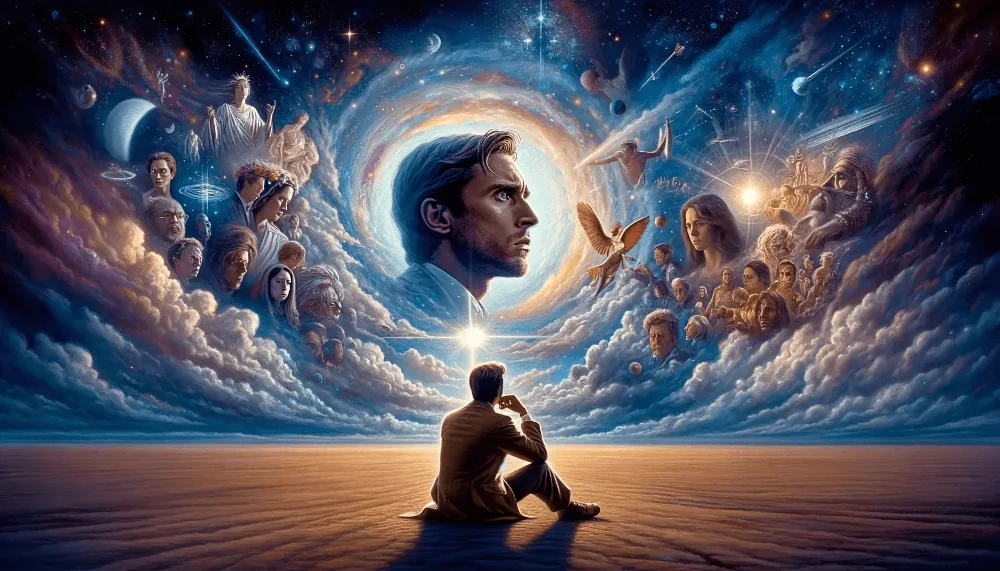
The Depth of Existential Exploration in Cinema
Cinema provides a unique medium for exploring philosophical and theological concepts. Films like “The Tree of Life” and “A Serious Man” delve into questions about the meaning of life, the existence of God, and the nature of the universe. These films encourage viewers to reflect on their beliefs and the mysteries of existence, offering a cinematic journey into the depths of human thought.
Philosophical Narratives and Character Development
Characters grappling with philosophical questions offer a window into the human soul’s complexities. In films like “The Matrix” and “Blade Runner,” protagonists confront existential dilemmas, leading to profound character development and narrative depth. These stories go beyond the surface, engaging audiences in a deeper level of thought and introspection.
Visual Representation of Abstract Concepts
Filmmakers use visual storytelling to represent abstract philosophical ideas, making them accessible and impactful for audiences. Through symbolic imagery and creative cinematography, films can convey complex concepts such as the nature of reality, free will, and the human condition. This visual representation enriches the narrative and enhances the viewer’s understanding of the themes.
The Role of Cinema in Philosophical Discourse
Films that tackle God and philosophical themes contribute to broader philosophical discourse. They provide a platform for discussing and interpreting these profound topics, often leading to diverse interpretations and discussions among viewers. Cinema, in this way, becomes a catalyst for philosophical exploration and dialogue.
Survival
The theme of survival in film captivates audiences with its portrayal of human resilience and endurance in the face of extreme circumstances. These narratives showcase the primal instinct to survive against all odds, often leading characters through intense physical and emotional journeys. In this segment, we explore how the survival theme is presented in cinema and its impact on storytelling and audiences.
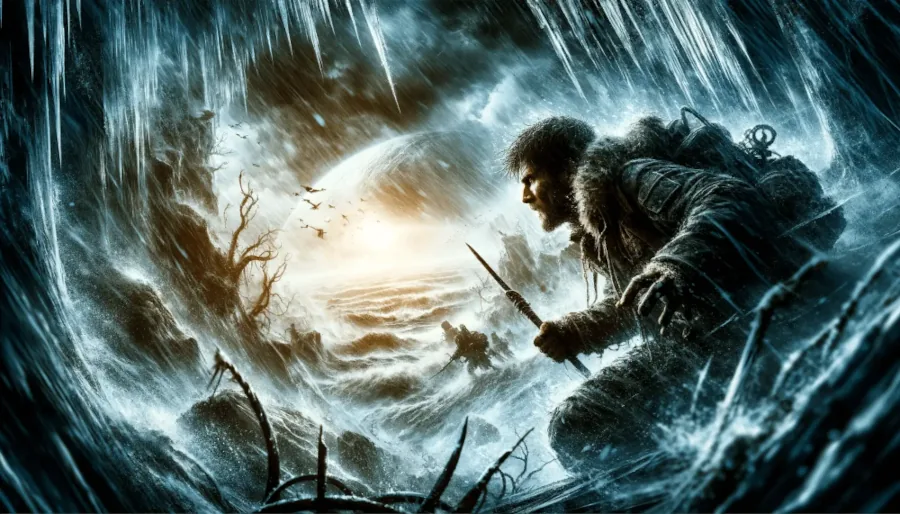
The Struggle for Survival
Films that center on survival often place characters in harsh, unforgiving environments, testing their physical and mental limits. Movies like “Cast Away” and “The Revenant” exemplify this, as they take viewers on a harrowing journey of survival against nature’s brutal forces. These settings create a visceral viewing experience, making the characters’ struggles palpable and relatable.
Character Resilience and Development
Survival-themed films often focus on character resilience, showcasing their journey from vulnerability to strength. Characters in films like “127 Hours” and “Gravity” demonstrate remarkable resourcefulness and determination, inspiring audiences with their tenacity and will to survive. These stories highlight the human capacity for adaptation and resilience in the face of adversity.
Emotional and Psychological Depths
Beyond physical survival, these films explore the psychological and emotional aspects of enduring extreme situations. They delve into themes of isolation, despair, hope, and the human spirit’s perseverance. Films like “Life of Pi” explore these depths, offering a profound look at the psychological impact of survival situations.
Survival as a Metaphor
In many films, the survival theme serves as a metaphor for broader human experiences and challenges. It can symbolize personal battles, emotional resilience, or the struggle against societal or internal conflicts. This metaphorical aspect adds layers of depth to the narrative, allowing audiences to find personal connections and meanings.
Impact on Audiences and Cinema
The theme of survival has a profound impact on audiences, often leaving them with a sense of awe and a deeper appreciation for the resilience of the human spirit. These films not only provide thrilling and engaging narratives but also inspire and uplift, reminding viewers of their own strength and capacity to overcome challenges.
Love and Conflict
In the realm of film, few themes have captivated audiences as profoundly as love and conflict. This theme is not just a storytelling device; it’s a reflection of the human condition, an exploration of the complexities of relationships and emotions. Films that masterfully weave love and conflict not only leave an indelible mark on the industry but also resonate deeply with audiences, transcending time and cultural barriers.
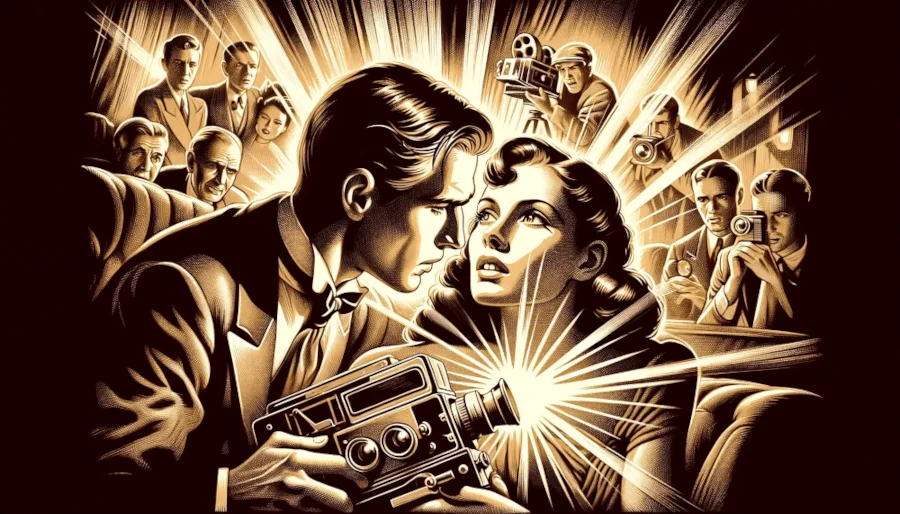
The Narrative of Love and Conflict
At its core, the theme of love and conflict taps into our most fundamental emotions. It mirrors the real-life struggles and triumphs that define human relationships. From classic tragedies like “Romeo and Juliet” to contemporary masterpieces like “La La Land,” the interplay of love and conflict has been a central pillar of cinematic storytelling. These films showcase the joy, pain, and ultimate resolution (or lack thereof) inherent in romantic relationships, making their stories universally relatable.
Cultural and Historical Contexts
This theme’s appeal often lies in its ability to adapt to various cultural and historical contexts. Whether it’s the passionate, forbidden love in “Casablanca” set against the backdrop of World War II or the nuanced portrayal of love amidst societal pressures in “Brokeback Mountain,” these films offer a window into the era and society they depict. They allow viewers to explore not just the emotions of the characters but also the larger social and historical forces at play.
The Role of Conflict in Evolving Relationships
Conflict in love stories is more than mere opposition; it’s a catalyst for character development and plot progression. It challenges the protagonists, tests their love, and ultimately leads to a deeper understanding of themselves and each other. Films like “Eternal Sunshine of the Spotless Mind” delve into the complexities of relationships, using conflict to reveal the intricate layers of love, memory, and identity.
Love and Conflict as a Mirror to the Viewer
These films often serve as mirrors, reflecting the viewers’ own experiences and emotions. They offer a space for audiences to empathize, reflect, and sometimes find solace. Whether it’s rooting for the couple to overcome their obstacles in “The Notebook” or feeling the heartbreak in “Titanic,” viewers find pieces of their own stories within these cinematic tales.
The Hero’s Journey
The concept of the Hero’s Journey, popularized by Joseph Campbell’s “The Hero with a Thousand Faces,” has become a cornerstone in cinematic storytelling. This archetypal template outlines a hero’s adventure, challenges, and eventual transformation, resonating deeply with audiences across cultures and generations. In this segment, we explore how the Hero’s Journey has shaped cinematic narratives and continues to inspire screenwriters.
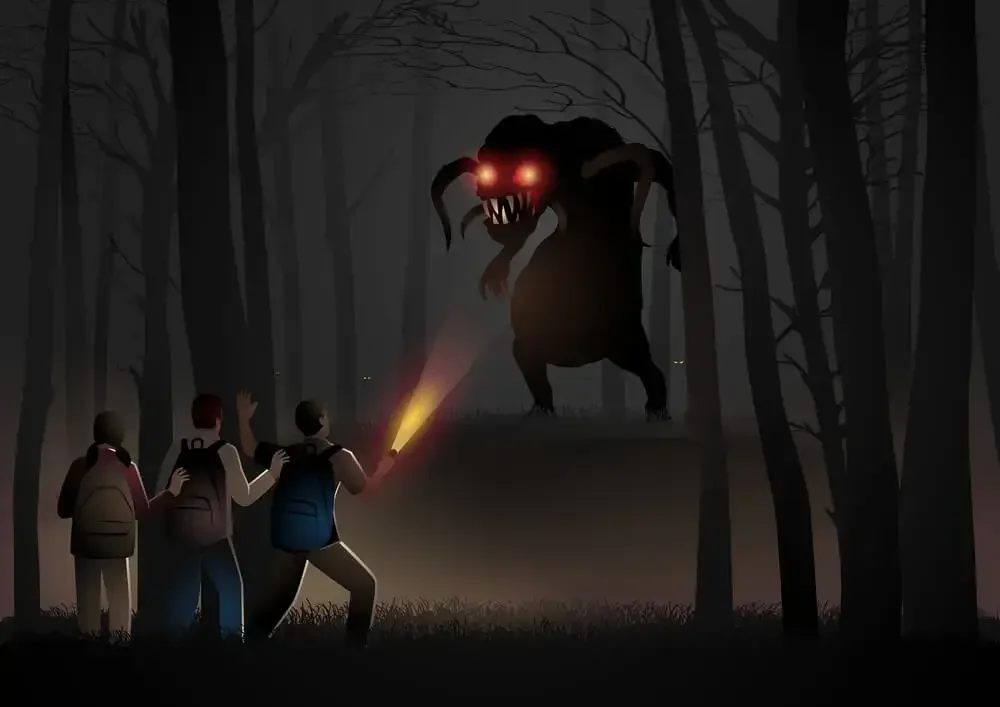
The Universal Appeal of the Hero’s Journey
At the heart of the Hero’s Journey lies its universal appeal. This narrative framework is seen in countless films, from “Star Wars” to “The Lion King.” It taps into fundamental human experiences and emotions, allowing viewers to see a part of themselves in the hero’s struggles and triumphs. This universal appeal makes the Hero’s Journey a powerful tool for screenwriters, enabling them to craft stories that connect with a diverse audience.
Key Stages of the Hero’s Journey in Film
The Hero’s Journey typically unfolds in several stages: the call to adventure, crossing the threshold, trials and tribulations, the ultimate boon, and the return. Films like “The Matrix” and “Harry Potter” showcase these stages, taking viewers on a journey from the ordinary world into an extraordinary one, filled with challenges and growth. These stages are not just plot points but steps in the hero’s personal transformation.
Archetypes and Their Role
Central to the Hero’s Journey are archetypes such as the mentor, the shadow, the ally, and the trickster. These characters, found in films like “The Lord of the Rings” and “Moana,” play crucial roles in the hero’s journey, providing guidance, opposition, support, or comic relief. They add depth to the narrative and help in conveying universal truths through the story.
Modern Interpretations and Variations
Contemporary cinema often presents variations of the Hero’s Journey, adapting the template to fit different genres and contexts. Films like “Black Panther” and “Wonder Woman” offer modern interpretations, incorporating elements like social commentary and diverse cultural backgrounds. These variations demonstrate the flexibility of the Hero’s Journey, making it relevant in today’s cinematic landscape.
The Impact on Storytelling
The enduring impact of the Hero’s Journey in film lies in its ability to evolve while maintaining its core essence. It continues to inspire screenwriters to explore new realms, create compelling characters, and tell stories that resonate with the fundamental aspects of human nature. As a storytelling tool, the Hero’s Journey remains as relevant today as it ever was, a testament to its universal appeal and adaptability.
Overcoming Adversity
The theme of overcoming adversity is a cornerstone of storytelling in cinema, resonating with audiences due to its universal appeal and inspirational message. Films that explore this theme not only entertain but also offer hope, demonstrating the human spirit’s capacity to triumph over challenges. This segment delves into the importance of this theme and its impact on both cinema and audiences.
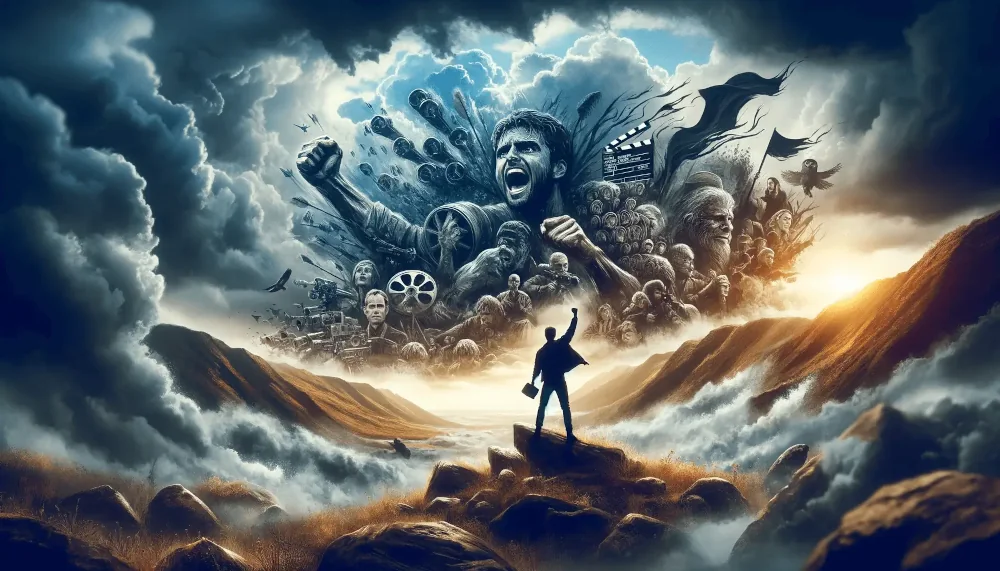
Triumph Over Challenges
The narrative of overcoming adversity connects with viewers across different cultures and backgrounds. Movies like “The Pursuit of Happiness” and “Rocky” showcase characters facing and conquering tremendous odds, providing viewers with a sense of hope and motivation. These stories often reflect our struggles, making the triumphs of the characters more impactful and inspiring.
Character Development Through Adversity
Adversity serves as a catalyst for character development in films. Characters are often forged through their struggles, emerging stronger and more resilient. This transformation is vividly portrayed in films like “Slumdog Millionaire” and “Life of Pi,” where the protagonists’ journeys through hardship lead to profound personal growth and self-discovery.
The Role of Adversity in Plot Progression
In many films, adversity is not just a backdrop but a key driver of the plot. It creates tension and conflict, essential elements for a compelling narrative. Films like “127 Hours” and “Cast Away” center around the protagonist’s struggle for survival, keeping audiences engaged and emotionally invested in the outcome.
Impact on Audiences
Films that depict overcoming adversity often leave a lasting impact on viewers. They serve as sources of inspiration, encouraging resilience and perseverance in the face of difficulties. These movies can be particularly uplifting during challenging times, offering a reminder of the strength and endurance of the human spirit.
The Appeal in Cinematic Storytelling
The enduring appeal of this theme in cinema lies in its ability to evoke powerful emotions and to inspire. As long as there are challenges to be faced, stories of overcoming adversity will remain relevant and compelling, continuing to captivate and uplift audiences worldwide.
Closing Thoughts
For screenwriters and filmmakers, understanding and effectively using these themes is key to crafting compelling, relatable, and thought-provoking stories. As we look towards the future of cinema, it is evident that these themes will continue to shape the art of filmmaking, captivating audiences and contributing to the rich tapestry of cinematic storytelling.
About RFM
RFM is a web-based video, TV, and film production management software that offers various features for professionals in the entertainment industry. It allows users to write professional project briefs and descriptions, talent, and actor showcases, visualize scenes with shot lists, media sharing and manage various aspects of production, including call sheets, shooting schedules, and script breakdowns. RFM is designed to help teams collaborate more effectively during the production process, making it a valuable tool for filmmakers, photographers, and video production companies
Read more of our articles here: Can you short crypto?